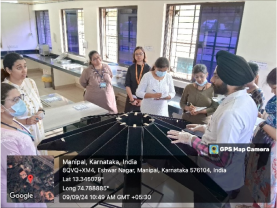



Foundations in Laboratory Animal Handling and Research
The 10-day internship program offers international students a comprehensive, hands-on training experience in laboratory animal science at MAHE’s state-of-the-art Central Animal Research Facility (CARF). Designed to bridge theoretical knowledge with practical skills, the program focuses on the ethical care, handling, and use of laboratory animals in biomedical research. Participants will gain experience working with commonly used rodent models such as rats and mice. The curriculum includes essential husbandry practices, environmental enrichment, health monitoring, and humane handling techniques. Students will also be trained in various experimental procedures including blood sampling, drug administration routes (oral, subcutaneous, intraperitoneal, etc.).
Dates: 2nd and 3rd week of July 2025 (Two credit program)
Learning Outcomes
On completion, students will be able to:
- Ethical handling and restraint techniques for laboratory rodents.
- Perform basic husbandry, health monitoring, and environmental enrichment.
- Execute common experimental procedures (e.g., blood collection, drug administration).
- Apply principles of the 3Rs and animal welfare in research settings.
- Execute in vivo experiments with appropriate controls and endpoints.
Course Contents
- Introduction to Laboratory Animal Science, Ethics, and 3Rs
- Identification, and Husbandry Practices
- Handling, Restraint, and Health Monitoring Techniques
- Experimental Procedures – Blood Collection & Drug Administration
Fee Details
The Program fee is USD 955 (Appx).
Included in the Fee:
- Accommodation at University Guest House (on a twin sharing basis) for the duration
- Breakfast and Lunch on all working days
- Internal Transport
- Medicare and Wi-Fi
Not Included in the Fee:
- Flight Tickets
- Travel other than that specified in Program
Pre-requisites
- Eligibility - Candidates in final/prefinal year of their undergraduate and postgraduate students from life sciences, biomedical sciences, veterinary, pharmacy, or allied health backgrounds. Applicants should have a keen interest in preclinical research and animal handling. Basic knowledge of biology and laboratory practices is recommended.
- Essential linear algebra for deep learning
- Fundamentals of linear classification: weights, bias, scores, and loss functions
- Calculus for the gradient descent algorithm
- Forward and backward propagation with regularization
- Batch processing for large datasets
- Linear to nonlinear classification via activation functions
- Computational setup of a shallow neural network
- Tuning neural network performance
- Pre-processing data and batch normalization
- Cross-validation for validating model performance
- Extending the computational setup from a shallow to a deep neural network
- Introduction to the TensorFlow library
- Application projects: implementing shallow and deep neural network models using TensorFlow; implementing machine learning models on edge devices using Edge Impulse.
Name of the Coordinators



Coordinator Details
- Department: Department of Pharmacology, MCOPS, MAHE, Manipal.
- Official email ID: nandakumar.k@manipal.edu
- Contact number: +91 7892573537
Program Highlights
- Emphasis on animal ethics, welfare, and 3Rs principle
- Exposure to real-time procedures
Offered by
Manipal College of Pharmaceutical Sciences, MAHE
